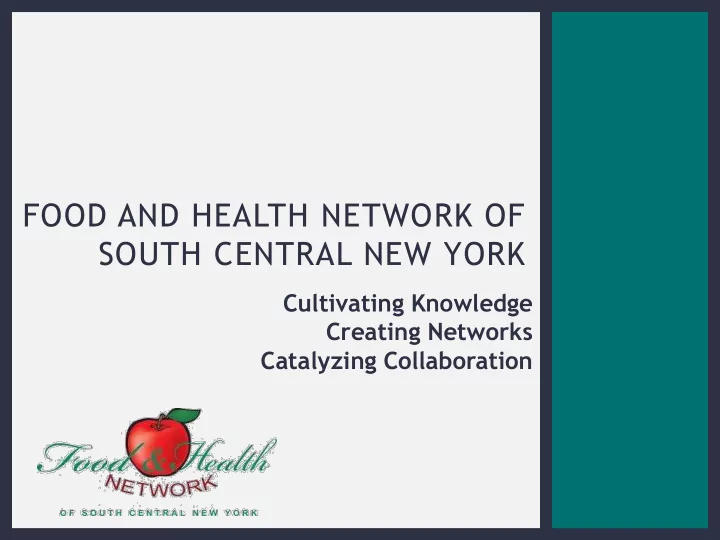

FOOD AND HEALTH NETWORK OF SOUTH CENTRAL NEW YORK Cultivating Knowledge Creating Networks Catalyzing Collaboration
WHO WE ARE A coalition of organizations and individuals aiming to create food-secure communities and improve the quality of life in SCNY by supporting practices, projects, and policies leading to increased use of nutritious, locally produced foods An interdisciplinary, systematic, and regional approach to impact SCNY’s food security.
STAKEHOLDERS Diverse stakeholders in 8 NY Counties: Broome, Chemung, Chenango, Cortland, Delaware, Otsego, Tioga, and Tompkins. Organizational, business, and individual members and sponsors Partners represent the agricultural, food security, nutrition and public health, environmental health/sustainability, planning/economic development, business, educational, and community sectors.
2014 FAHN MEMBERS AND SPONSORS ORGANIZATION/BUSINESS Karen Bayer Healthy Lifestyles Coalition Mark Bordeau (United Way) Binghamton Regional Beth Bossong Sustainability Coalition NBT Bank Ray Denniston Broome County Council of Rural Health Network of Nancy Eckstrom Churches SCNY Matthew Griffin Broome County Health Seven Valley’s Health Pamela Guth Department Coalition Sonia Janiszewski Broome Tioga BOCES Food Tioga County Farm Bureau Sarah Manchester Service Tioga County Hunger Glenda Neff Center For Agricultural Coalition Susan Paredez Development and Tioga Opportunities Inc. Entrepreneurship Jeffrey Piestrak Tompkins County Food Chenango County Health Charles Place Distribution Network Department Tony Preus TouchPoint Support Services Chenango Health Network at Lourdes Hospital Jack Salo Cornell Cooperative United Health Services Linda Seeger Extension Broome County VINES: Volunteers Improving Natalie Thompson Davidson Fox & Company Neighborhood Environments Lauren Tonti Finger Lakes Fresh Food Hub Jennifer Wilkins & Challenge Workforce INDIVIDUAL Shawn Yetter Solutions Victoria Zeppelin Food Bank of the Southern Susan Adair Tier Diane Albrecht Hatherleigh Foundation Richard Andrus
WHY AND HOW FARM TO CONSUMER HEALTHY ENVIRONMENTS ECONOMIC VITALITY HEALTHY PEOPLE
PROJECTS AND PROGRAMS Regional Food System Assessment Farm to School Healthy Food Procurement Community Garden Inventory Educational Meetings Monthly Newsletter and Social Media "FaHN represents an important nexus in the discussion of local food, agriculture, and community.” -Andrew Flach, Hatherleigh Foundation
POLICY RECOMMENDATIONS: SUPPORTING REGIONAL NETWORKS AND FOOD POLICY COUNCILS Develop and provide support for a statewide food system network that will provide resources and networking opportunities for existing regional and community food policy councils and that would also support development of new FPCs. Implement state funding to support regional and community food networks and FPCs
FOOD SECURITY
REGIONAL FOOD SYSTEM ASSESSMENT 4 Themes Quantitative and qualitative data grounded in the context of the food cycle Planning, evaluation, and educational tool
2014 FOOD SYSTEM ASSESSMENT UPDATE: FOOD SECURITY PROGRESS Focus on food security and progress since 2012 Highlight of findings: More eligible recipients benefiting from Food Stamps Increased sales at farmers’ markets with EBT More CSAs providing shares to low income residents More ground venison donated to food banks More fresh produce distributed by food banks to hunger relief agencies
CHALLENGES TO FOOD SECURITY 1 in 5 children are food insecure “Hunger Doesn’t Take a Vacation ”: 4 out of 5 youth from low income families are missing out on free summer meals with the Summer Food Service Program.
POLICY & ACTION OPPORTUNITIES Increase SNAP participation by: Increasing outreach and education to vulnerable populations with low participation. Creating linkages between Medicaid and SNAP databases to conduct “in - reach” with Medicaid recipients currently not receiving SNAP. Increase access to Summer Food Service Program (SFSP) by: Changing the eligibility threshold for a community to host an open meal site Eliminating the congregate requirement that children eat meals on- site
Featuring the “Sustaining FARM TO Farm to School in SCHOOL/INSTITUTION NYS” pilot project
PROJECT SUMMARY USDA Implementation Grant administered by NYS Department of Agriculture & Markets, 2012-2014 Purpose: Increase local food procurement in school cafeterias through producer partnerships, food safety, and nutrition promotion Primary Partners: Broome-Tioga BOCES Food Service and School Districts, Food and Health Network SCNY, Broome County Cornell Cooperative Extension
LOCAL PROCUREMENT STRATEGIES Relationship-building with producers, food hubs, and distributors Education along the value chain, including food safety training Incentivizing through the geographic preference bid
SUCCESSES 13,000 pounds local food procured 3 Producers: Benton Berries (Penn Yan, Yates Cty.), Reisinger’s Apple Country (Watkins Glen, Schuyler Cty.), and Main St. Farms (Homer, Cortland Cty.) 5 School Districts: Binghamton City, Johnson City, Owego-Appalachin, Union-Endicott, and Whitney Point
POLICY OPPORTUNITIES Enhancing market readiness (ability to serve large-volume, wholesale markets) of NYS producers by: Expanding state support for market readiness trainings and for food safety initiatives, including funding and educational support for producers undergoing food safety training and GAP certification. Support increased access to local food year-round by: Developing monetary incentives for purchasing local food: Support the New York School Nutrition Association’s proposed pilot project that includes up to 20 cents in additional state reimbursement for districts that purchase a certain % of NY grown fruits, vegetables or proteins Mandating funding for the NYS Farm to School program administered through NYSDAM, including a Full-Time administrative position Supporting training through the State Education Department for Food Service Directors that will address Farm to School, school gardens and proper procurement practices (first training to be held summer 2015).
RECOMMENDATIONS FOR THE NEW YORK STATE COUNCIL ON FOOD POLICY
Supporting regional/community food networks and policy councils, by developing and providing support for a statewide food system network that will provide resources and networking opportunities for existing regional and community food policy councils and that would also support development of new FPCs. Supporting food access for low-income families, especially children, by linking SNAP and Medicaid databases and conducting SNAP “in reach”; and advocating for improvements to the federal Summer Food Service Program. Supporting local food procurement in institutions, especially schools, by advocating for expansion of state support for market readiness trainings and for food safety initiatives, including funding and educational support for producers undergoing food safety training and GAP certification.
The Food and Health Network thanks you for this opportunity to share our ideas and experience. We are grateful for your attention and openness. CONTACT INFO: http://foodandhealthnetwork.org/ rhsc-rf@rhnscny.org
Recommend
More recommend